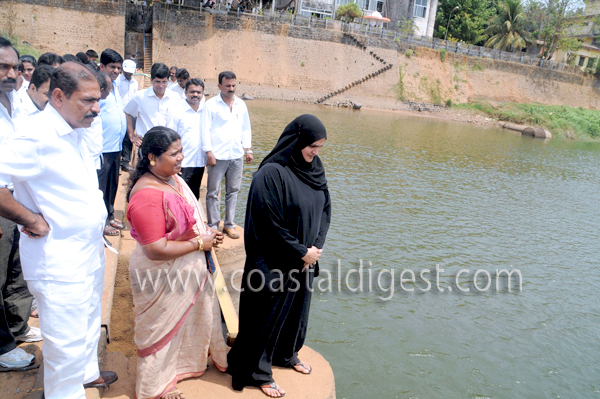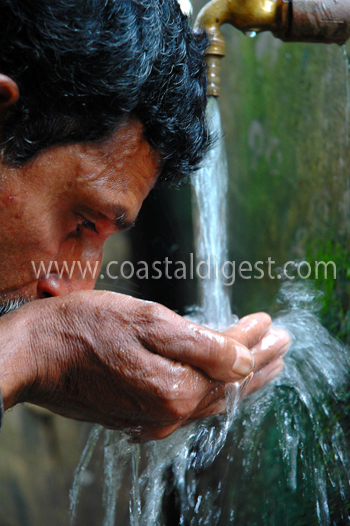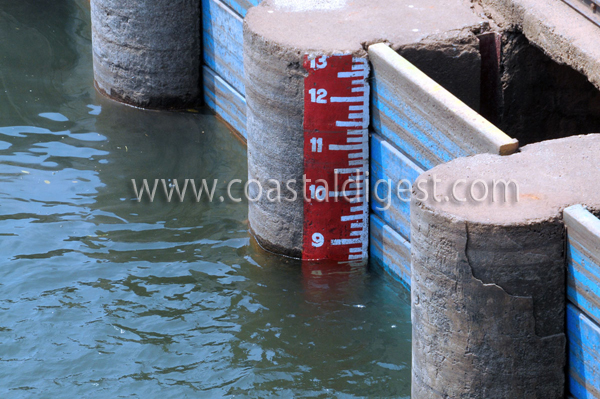 ‘Water water everywhere, not a drop to drink’ cried Coleridge’s ancient mariner. The coastal city of Mangalore too is up against a ‘water crisis’ this summer. The worrying part though is that the alarm bells have sounded even before the onset of peak months of April and May.
‘Water water everywhere, not a drop to drink’ cried Coleridge’s ancient mariner. The coastal city of Mangalore too is up against a ‘water crisis’ this summer. The worrying part though is that the alarm bells have sounded even before the onset of peak months of April and May.
On March 25, MLA YogishBhat at a press meet delivered a shocker by stating that water level at Thumbe dam, the only source of drinking water for Mangalore, had dropped down drastically, so much so, that it would suffice for mere nine more days. Mayor GulzarBanu held an inspection at the dam site the very next day and found that the level had indeed nosedived. The level stood at 8’-9”ft while about a month ago, it was more than 13 ft on the occasion of Ganga Puja at the dam. The dip in water level has been alarming this year as compared to water levels recorded on the same date (March 26) in years 2011, 2010, 2009, 2008 and 2007 which stood at 12’-0”, 11’-8”, 13’-0”, 12’-3”, and 12’-2” respectively.
Dr. Harish, Commissioner, Mangalore City Corporation, says that in the wake of reduction in water level, supply to Ullal and Mulky has also been reduced. Ullal would get about 2.5 mld of water earlier but now it has been reduced to 0.5 mld which is being released once in three days or so. Similarly, Mulky will now receive 0.5 mld on a similar frequency. “The dam, in its full capacity, and with 24 hours of water supply (145 mld), can fulfill water needs for 45 days. Now there has been a dip in water level so the supply would be reduced and the frequency too. It hadn’t rained beyond November this year and there was no rain in catchment areas this time. The river inflow has reduced and evaporation too is taking place faster these days. We request people to be more cautious in their water spending and cooperate with the MCC if it takes tough measures. We are hopeful of rains in catchment areas and if that happens, the entire scenario will change. Nevertheless, in case water shortage continues, we will still be prepared and bring the borewell and tanker services into play”, the Commissioner says.
It is also noteworthy that the corporation would earlier pump water with just two pumps. But about a year ago, it added two more pumps resulting in pumping up to 160 mld every day.

As of now, water to all wards is being supplied by the Corporation on alternate days. However, no set time-table is being followed by the Corporation, which has understandably caused inconvenience to the public, something that the Mayor is aware of herself.
“I have been receiving complaints from people of my own ward about the irregular timings of water supply. The other day, water was supplied for a few hours at night when hardly anyone knew. I am very much aware that no set timings are in place as of now and have asked the water supply department to draft a chart” Ms. Banu discloses.
The people are not amused. They have additional problems to deal with too. “Linemen block the gate wall and divert water supply to whoever fills their pockets. First of all they supply water with lesser frequency nowadays and on top of that when people engage in such bribing, we are left with no water” says a frustrated PrakashShetty of Katipalla, 4thblock.
On the other hand, there is the problem of water leakage. It is present at Thumbay dam itself which is why the authorities there have made arrangements to pump back the leaked water into the dam. Other leakages come in the form of broken pipes and pipelines.
The problem faced in Bendorewell earlier this month was one example. Streets were flooded with water and caused massive inconvenience to public and shop owners alike. The digging and road repair works too went on at a snail pace resulting in traffic congestion at the area causing additional ordeal for citizens. MCC Commissioner Dr. Kumar says that such leakage problems are being caused due to fluctuating pressure and the old pipeline system.
“The Chief Minister in his budget speech has spoken about 24x7 water supply programme under which fresh pipelines will be laid which will ensure that there is uniform pressure and hopefully this problem will be solved”, he says.
The Mayor had announced after her inspection of the Thumbay dam that water supply to industries and construction projects would be stopped. But it seems the orders are not being carried out with sincerity, at least as far as water supply to construction sites is concerned. “The lineman is supplying water to a Land Links construction project and we are struggling for water in our homes. Last night was worse. There was no water for even toilet use”, says AnithaPai of Derebail. When Coastal Mirror brought to the notice of the Mayor the alleged supply of water to construction site, she said she wasn’t aware of it and assured that the matter would be looked into.
However water supply to industrial purposes has been stopped. Following the move to draw water from MRPL’s dam, the level at Thumbe dam has risen to 9.5 ft. The Corporation is eyeing the option of borrowing water from Lakya dam belonging to KIOCL too. Ever since Kudremukh iron ore operations came to a standstill, the MCC had been looking at the option of capitalizing on the water no longer in use at the dam for KIOCL. With geographical factors also working in its favour in terms of gravitation pull which means that there is no real need of pumping water, the MCC is seriously considering the option to address the current water crisis.
 But there are experts who feel that had proper planning and water conservation methods been implemented, there was no need to think of borrowing water from Lakya dam in the first place.
But there are experts who feel that had proper planning and water conservation methods been implemented, there was no need to think of borrowing water from Lakya dam in the first place.
Awareness among people regarding the need to conserve water, Mr. Padre says is quintessential.
“The problem with people of Udupi and Dakhsina Kannada is they see water in large quantities during the monsoons and take it for granted, hardly thinking about conservation. But when summer strikes, everyone wakes up and cries water scarcity. The idea of rain water harvesting has to be made common. Judicious water spending is also something that must start from home. People must be judicious enough as to what is the minimum amount of water required to flush their toilets. We see in some places that the pressure of water in taps meant for hand wash would be so high that at times you end up drenching your shirt. This should be avoided”, opines Mr. Padre.
The authorities can bring in a few more changes like bringing in billing for individual flats, Mr. Padre suggests. “The flat culture has now become a part and parcel of cities like Mangalore. Under the current billing system, say if 50 families are staying in one building, a collective water bill is charged. If authorities start charging each of those families or flats separately, perhaps people will be more careful in spending water. This system has brought some positive results in cities like Bangalore and Hyderabad,” Mr, Padre reveals.

The city’s water woes were discussed in the first council meet after the budget session at the MCC wherein Congress and BJP corporators indulged in blame game over a host of issues, one of them being the work in progress of the new vented dam at Thumbe.
YogishBhat, while admitting that there has been a delay in progress of the work, expressed hope that it would be ready by next year.
“It should have been ready by now. But work has now gathered pace and is even being carried out at night. By next year, with the complete vented dam, will have enough storage facility of water to satisfy the water needs of the region for the entire summer”, the MLA said.
Photos by Ahmed Anwar






Comments
We have been working with water issues for two decades now. Of relevance today to MANGALURU ( MANGALORE ), is the water crisis. We have understood how coastal wells are actually fed from the sea. Those wells which provided good water in the past can be fixed by our Eco Technology which is cost effective, needs no machinery and energy. Coastal wells can provide limited amounts of water on a perenial basis even if there is no rain. I learnt that the Mangaore Corporation has identified some private wells and is drawing water for public distribution, to provide succor to its citizens. I am visiting MANGAORE, will leave on 9th June 2016 for Mumbai. My number is +91 8454097701. I will be happy to make a presentation to explain how MANGALORE can plan its water security very simply.
Add new comment